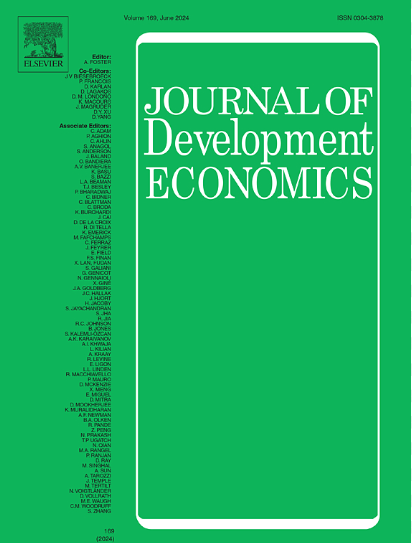Digitalization as a double-edged sword: Winning services and losing manufacturing in India
IF 4.6
1区 经济学
Q1 ECONOMICS
引用次数: 0
Abstract
Digitalization can increase firm productivity, but in developing countries with labor market frictions, not all firms are able to capitalize on digitalization opportunities. This study uses data from India – where a demonetization policy led to a large increase in digital payments – to examine the impacts of digitalization on firms across sectors in a developing country in the short run. I find that service firms experienced growth in income and productivity while manufacturing firms witnessed a decline. I then explore the mechanisms driving this divergence. The results show that service firms invested more in information and communications technology (ICT) capital and hired more complementary skilled ICT labor, whereas manufacturing firms did not. Notably, this influx of skilled ICT workers into the service sector was drawn from the manufacturing sector due to limited spatial labor mobility. During this period, wages for ICT labor were driven up while remaining stagnant for other workers. These findings underscore how digitalization, in the presence of labor market constraints, can exacerbate short-term sectoral divergence in productivity growth and shed light on its impacts on the growth trajectories of developing countries.
数字化是一把双刃剑:印度服务业赢了,制造业输了
数字化可以提高企业生产率,但在存在劳动力市场摩擦的发展中国家,并非所有企业都能够利用数字化机会。本研究使用来自印度的数据——印度的废钞政策导致了数字支付的大幅增长——来研究数字化在短期内对发展中国家各行业企业的影响。我发现,服务企业的收入和生产率都在增长,而制造业企业的收入和生产率却在下降。然后,我将探讨导致这种分歧的机制。结果表明,服务业企业对信息通信技术(ICT)资本的投入和雇佣互补性较强的熟练ICT劳动力,而制造业企业则不然。值得注意的是,由于劳动力空间流动性有限,流入服务部门的熟练信通技术工人来自制造业。在此期间,信息通信技术劳动力的工资上涨,而其他工人的工资却停滞不前。这些发现强调了在劳动力市场存在约束的情况下,数字化如何加剧生产率增长的短期部门差异,并揭示了其对发展中国家增长轨迹的影响。
本文章由计算机程序翻译,如有差异,请以英文原文为准。
求助全文
约1分钟内获得全文
求助全文
来源期刊

Journal of Development Economics
ECONOMICS-
CiteScore
8.30
自引率
4.00%
发文量
126
审稿时长
72 days
期刊介绍:
The Journal of Development Economics publishes papers relating to all aspects of economic development - from immediate policy concerns to structural problems of underdevelopment. The emphasis is on quantitative or analytical work, which is relevant as well as intellectually stimulating.
 求助内容:
求助内容: 应助结果提醒方式:
应助结果提醒方式:


